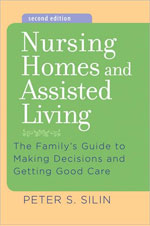The Issue of Living at Risk and Competency
In the paper the other day there was an article about a B.C. Supreme Court decision. It allowed an 86 year old man to continue to spend his money as he wished. He had met a woman half his age in Florida. He was apparently running up debt by spending on her or for her, and the daughters, who had power of attorney, transferred the title of his condo to protect his only real asset. He sued and the judge sided with him, saying the daughters could no do that.
Risk and competency are the hardest things for caregivers to deal with in some ways. In the earlier or even moderate stages of dementia or other diseases, there is often no real clarity as to how competent someone is. There are opinions, there are signs that point one way of the other. The lack of clarity is what gives rise to guilt, sometimes family strife and stress, where there are differing opinions, and sometims sorrow and damage.
I do a lot of lecturing; I often talk about risk: does someone have the capacity to understnad and appreciate the nature and consequences of their actions, and how are the actions impacting on others? That is the simple question.
But there is more--there is the question of what would someone have wanted, even if they are cognitively impaired? Would they have wanted to be allowed to put themselves or their finances at risk? Would they have wanted to risk death living at home, rather than moving to a care facility? And what responsibility do caregivers have, legally and morally, to remember and heed those wishes or to not heed them.
What would that same person have done, if they were in the caregiving position, rather than the care receiver?
What do you and I want if it comes to that for ourselves?
The bottom line is, we are all allowed to take risks, and we are allowed to do things which others would consider stupid or foolish. We have probably all done it.
So here are some suggestions:
1. In British Columbia we have representation agreeements which spell out a lot of these issues, more clearly than a living will,. Use one, or write out something that is like that.
2. Have a conversation with someone when they are well about what they want you to do, and what they would have done.
3. Ask them what they want to use as guidelines or triggers, for when they want someone to take over. Use specific examples of money, health, last wishes, housing.
4. Make sure someone has a very good medical assessment that will rule out reversible problems and will treat what can be treated. Is it dementia? Is it delirium? Is it late onset manic episode or depression?
5. Involve a third party such as a Geriatric Care Manager or lawyer, or doctor, or financial advisor, or best yet, all of them in a consultative team. Various ones of these people can take a different role.
6. Ask yourself, what is the worst thing that could happen?
7. Make sure you deal with and confront your own feelings of guilt and grief so that you deal with them appropriately, rather than act them out inappropriately by trying to set limits on someone else.
7. If you are not the one taking the risk, ask that person what they see as the worst thing that would happen if the path they are on continues. Are they willing to accept that risk?
8. In discussion with the person, let them know what your limits are in terms of the issue.
9. Talk about it. Talk to friends or professionals or your spiritual advisor, or whoever, so that you have some clarity on the situation.




<< Home